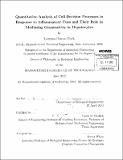Quantitative analysis of cell decision processes in response to inflammatory cues and their role in mediating genotoxicity in hepatocytes
Author(s)
Buck, Lorenna Dianne
DownloadFull printable version (18.74Mb)
Other Contributors
Massachusetts Institute of Technology. Department of Biological Engineering.
Advisor
Linda G. Griffith.
Terms of use
Metadata
Show full item recordAbstract
While a link between chronic inflammation and cancer has been established, the mechanisms of genotoxicity in inflammatory environments remain poorly understood. We hypothesized that inflammation may provide cues that allow cells to survive in the face of significant DNA damage as well as cues that foster cell proliferation. This study sought to elucidate changes that influence hepatocyte decision processes under conditions of chronic inflammation by using a set of extracellular signals, both soluble and matrix-related, which can be varied systematically to create a diverse range of intracellular signaling states and phenotypic outcomes. We developed an easily translatable model system that can maintain primary mouse hepatocytes in a differentiated state and study the independent extracellular cues which regulate hepatocyte behavior during chronic inflammation. This model system allowed systematic variation of oxygen concentration as well as matrix composition and stiffness. Collagen, polyacrylamide, and RADA gels were used to create extracellular environments resembling the various stages of normal and fibrotic liver. Through careful control of medium depth and incubator oxygen levels, we determined that oxygen tension and extracellular matrix affected hepatocyte differentiation independently, and that both high oxygen and a compliant matrix environment are necessary for prolonged maintenance of primary mouse hepatocytes in vitro. Optimization of a quantitative imaging solution enabled the capture of rare events occurring in individual cells within a larger cell population. Using TNF-alpha, Fas ligand and, IL-6 cytokines in conjunction with oxygen and matrix cues, we investigated how extracellular stimuli influence cell fate in a pseudo-inflammatory environment and demonstrated that partial execution of apoptosis is a possible mechanism for genotoxicity in hepatocytes during chronic inflammation. The results of this study improve our understanding of how cues in the extracellular environment combine to influence the behavior primary mouse hepatocytes. The system we developed can be used as a platform for a multitude of in vitro applications including studies regarding drug toxicity and inflammation.
Description
Thesis: Ph. D., Massachusetts Institute of Technology, Department of Biological Engineering, 2012. Cataloged from PDF version of thesis. Includes bibliographical references (pages 189-211).
Date issued
2012Department
Massachusetts Institute of Technology. Department of Biological EngineeringPublisher
Massachusetts Institute of Technology
Keywords
Biological Engineering.